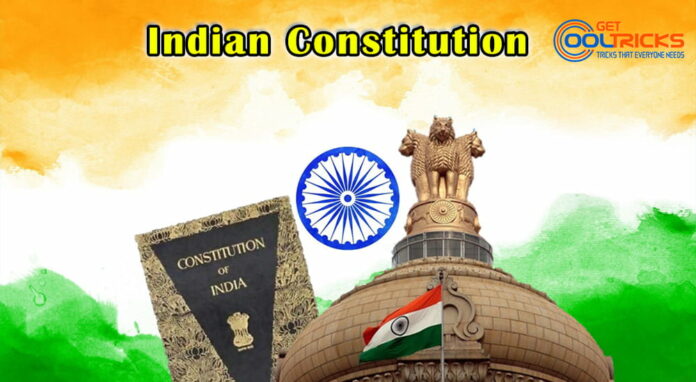The preamble to the Indian Constitution
WE, THE PEOPLE OF INDIA, having solemnly resolved to constitute India into a SOVEREIGN, SOCIALIST, SECULAR, DEMOCRATIC, REPUBLIC and to secure to all its citizens:
JUSTICE, social, economic and political;
LIBERTY of thought, expression, belief, faith and worship;
EQUALITY of status and of opportunity; and to promote among them all
FRATERNITY assuring the dignity of the individual and the unity and integrity of the nation;
IN OUR CONSTITUENT ASSEMBLY this twenty-sixth day of November 1949, do HEREBY ADOPT, ENACT AND GIVE TO OURSELVES THIS CONSTITUTION.
The Union and its Territory: Part I (Articles 1- 4)
1 Name and territory of the Union.
2 Admission or establishment of new States.
2A [Repealed.]
3 Formation of new States and alteration of areas, boundaries or names of existing States.
4 Laws made under articles 2 and 3 to provide for the amendment of the First and the Fourth Schedules and supplemental, incidental and consequential matters.
Citizenship: Part II : (Articles 5-11)
5 Citizenship at the commencement of the Constitution.
6 Rights of citizenship of certain persons who have migrated to India from Pakistan.
7 Rights of citizenship of certain migrants to Pakistan.
8 Rights of citizenship of certain persons of Indian origin residing outside India.
9 Persons voluntarily acquiring citizenship of a foreign State not to be citizens.
10 Continuance of the rights of citizenship.
11 Parliament to regulate the right of citizenship by law.
Fundamental Rights: Part III (Articles 12-35)
General
12 Definition.
13 Laws inconsistent with or in derogation of the fundamental rights.
Right to Equality
14 Equality before law.
15 Prohibition of discrimination on grounds of religion, race, caste, sex or place of birth.
16 Equality of opportunity in matters of public employment.
17 Abolition of Untouchability.
18 Abolition of titles.
Right to Freedom
19 Protection of certain rights regarding freedom of speech, etc.
20 Protection in respect of conviction for offences.
21 Protection of life and personal liberty.
21A Right to education
22 Protection against arrest and detention in certain cases.
Right against Exploitation
23 Prohibition of traffic in human beings and forced labour.
24 Prohibition of employment of children in factories, etc.
Right to Freedom of Religion
25 Freedom of conscience and free profession, practice and propagation of religion.
26 Freedom to manage religious affairs.
27 Freedom as to payment of taxes for the promotion of any particular religion.
28 Freedom as to attendance at religious instruction or religious worship in certain educational institutions.
Cultural and Educational Rights
29 Protection of interests of minorities.
30 Right of minorities to establish and administer educational institutions.
31 [Repealed.]
Saving of Certain Laws
31A Saving of Laws providing for the acquisition of estates, etc.
31B Validation of certain Acts and Regulations.
31C Saving of laws giving effect to certain directive principles.
31D [Repealed.]
Right to Constitutional Remedies
32 Remedies for enforcement of rights conferred by this Part.
32A [Repealed.]
33 Power of Parliament to modify the rights conferred by this Part in their application to Forces, etc.
34 Restriction on rights conferred by this Part while martial law is in force in any area.
35 Legislation to give effect to the provisions of this Part.
Directive Principles of Our State Policy: Part IV (Articles 36-51)
36 Definition.
37 Application of the principles contained in this Part.
38 State to secure a social order for the promotion of the welfare of the people.
39 Certain principles of policy to be followed by the State.
39A Equal justice and free legal aid.
40 The organisation of village panchayats.
41 Right to work, to education and to public assistance in certain cases.
42 Provision for just and humane conditions of work and maternity relief.
43 Living wage, etc., for workers.
43A Participation of workers in the management of industries.
43B Promotion of co-operative societies.
44 Uniform civil code for the citizens.
45 Provision for free and compulsory education for children.
46 Promotion of educational and economic interests of Scheduled Castes, Scheduled Tribes and other weaker sections.
47 Duty of the State to raise the level of nutrition and the standard of living and to improve public health.
48 The organisation of agriculture and animal husbandry.
48A Protection and improvement of environment and safeguarding of forests and wildlife.
49 Protection of monuments and places and objects of national importance.
50 Separation of judiciary from the executive.
51 Promotion of international peace and security.
Fundamental Duties: Part IVA (Article 51A)
It shall be the duty of every citizen of India –
(a) to abide by the Constitution and respect its ideals and institutions, the National Flag and the National Anthem;
(b) to cherish and follow the noble ideals which inspired our national struggle for freedom;
(c) to uphold and protect the sovereignty, unity and integrity of India;
(d) to defend the country and render national service when called upon to do so;
(e) to promote harmony and the spirit of common brotherhood amongst all the people of India transcending religious, linguistic and regional or sectional diversities; to renounce practices derogatory to the dignity of women;
(f) to value and preserve the rich heritage of our composite culture;
(g) to protect and improve the natural environment including forests, lakes, rivers and wildlife, and to have compassion for living creatures;
(h) to develop the scientific temper, humanism and the spirit of inquiry and reform;
(i) to safeguard public property and to abjure violence;
(j) to strive towards excellence in all spheres of individual and collective activity so that the nation constantly rises to higher levels of endeavour and achievement.
(k) to provide opportunities for education by the parent the guardian, to his child, or a ward between the age of 6-14 years as the case may be.


